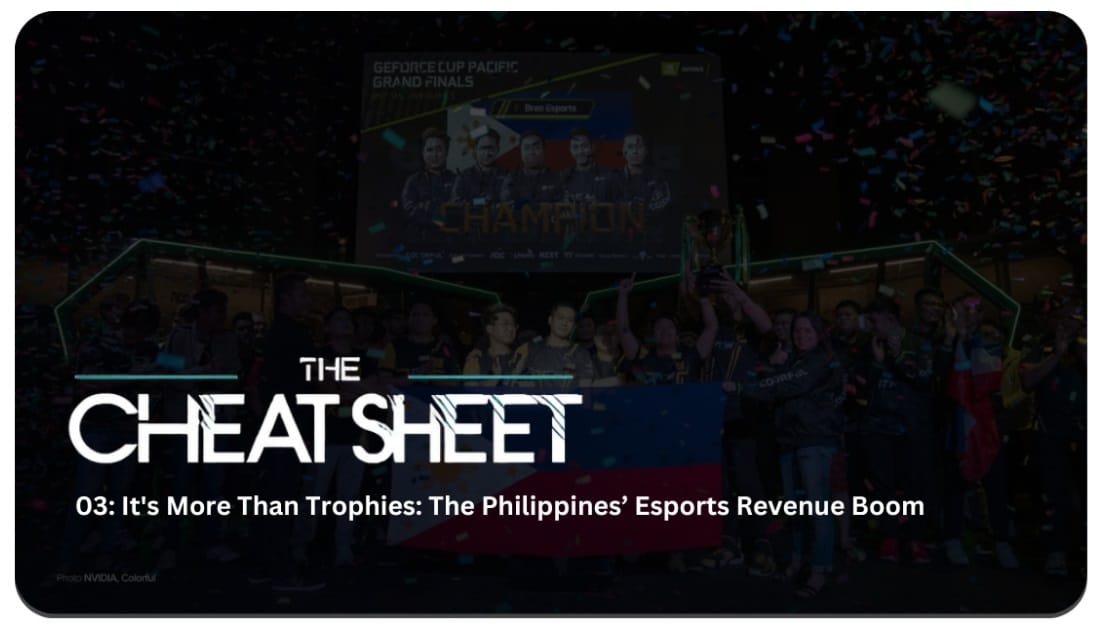- THE CHEAT SHEET
- Posts
- 03: It's More Than Trophies: The Philippines’ Esports Revenue Boom
03: It's More Than Trophies: The Philippines’ Esports Revenue Boom
More than just championships—Philippine esports is securing its sustainability.

Did you know? The Philippines is the leader in esports within Southeast Asia and is expected to reach a market size of approximately $25.1 million by 2029, with a compound annual growth rate (CAGR) of 7.02%. With over 43 million active gamers and a steady annual growth rate of 12.9% since 2017, the Philippines is proving to be a powerhouse in the esports industry.
The mobile gaming segment in the Philippines is thriving, with revenues projected to reach $1.5 billion by 2025. Filipino gamers have been making a strong impact in international esports tournaments for major mobile gaming titles like ML:BB, PUBG, HOK, LOL:WR, Free Fire, Pokemon Unite, and more. In several of these games, they are either current world champions or have held the title in recent years.
Government Support and Recognition
In 2017, the Philippine government officially recognized esports as a professional sport, which gave the sector legitimacy and opened up new opportunities for funding, partnerships, and support. This move has paved the way for increased investments and the development of esports infrastructure.
The government has been offering incentives, including tax breaks and support for events, to help boost the esports sector. This has attracted both local and international investors looking to capitalize on the growing esports audience in the country. The government has also been promoting esports as a key component of the digital economy.
Investments
The esports sector in the Philippines has seen significant venture capital investment. Organizations like AcadArena raised $3.5 million in funding to build esports ecosystems within schools and universities. Major brands, such as Coca-Cola, Globe Telecom, and PLDT, have also jumped in, sponsoring esports events and teams.
Gaming giants like Riot Games and Activision Blizzard have established regional offices in the Philippines. Global companies like Tencent, Riot Games, and Garena are investing heavily in the local esports ecosystem by sponsoring tournaments, supporting local teams, and offering training programs and resources.
As esports continues to grow, new arenas are being built to host major tournaments, and local communities are encouraged to engage with the industry. Mineski, for example, has been leading the way with dedicated gaming hubs that offer professional training facilities and event spaces. AcadArena has also made a significant impact by partnering with universities and attracting investors. Many colleges and universities are now offering esports scholarships and creating dedicated programs, providing new educational and career opportunities in esports.
Regional Esports Giants
Mineski is one of the oldest and most well-known esports organizations in Southeast Asia. It has a deep-rooted presence in the Philippine esports ecosystem, particularly in Dota 2 and Mobile Legends.
Bren Esports has quickly become one of the leading esports organizations in the Philippines. The organization is known for its high-profile teams and success in various esports titles such as Mobile Legends, Call of Duty: Mobile, Free Fire, and PUBG Mobile.
TNC Pro Team is a legendary esports organization in the Philippines, particularly well-known for its success in Dota 2.
Blacklist International is the fastest-growing esports organization in the Philippines. The organization made waves with its impressive performance in Mobile Legends tournaments. They recently won MPL Philippines Season 7, establishing itself as one of the top teams in the region.
Future Outlook
The youth in the Philippines are heavily invested in gaming, with many seeing it as a potential career option. As gaming culture becomes more mainstream, the country's youth will play a pivotal role in driving the esports scene forward. More young players are getting involved in competitive gaming, and the rise of esports academies and training programs is encouraging talent development.
There has been an increase in grassroots-level esports initiatives aimed at nurturing young players. Organizations like PeSO (Philippine Esports Organization) and local tournaments help identify up-and-coming talent. The Philippines is well-positioned to continue leading the Southeast Asian esports market. The Philippines is already a regional powerhouse in games like Mobile Legends, Dota 2, and Valorant, and its international teams (like TNC Pro Team, Bren Esports, and Blacklist International) are gaining recognition across the globe. The Philippines has already hosted several global esports events like ESL One Manila and the SEA Games esports events, and it is likely that the country will continue to be a key destination for international esports tournaments.
Conclusion
The esports industry in the Philippines is set for significant growth, driven by increased investment, strong mobile gaming demand, improved infrastructure, and growing youth engagement. With government support and rising global recognition, the Philippines is poised to become a key esports hub in Southeast Asia. However, challenges like talent retention and regional infrastructure need addressing. Overall, the future of esports in the Philippines is bright, with opportunities for continued expansion and success.
Reply